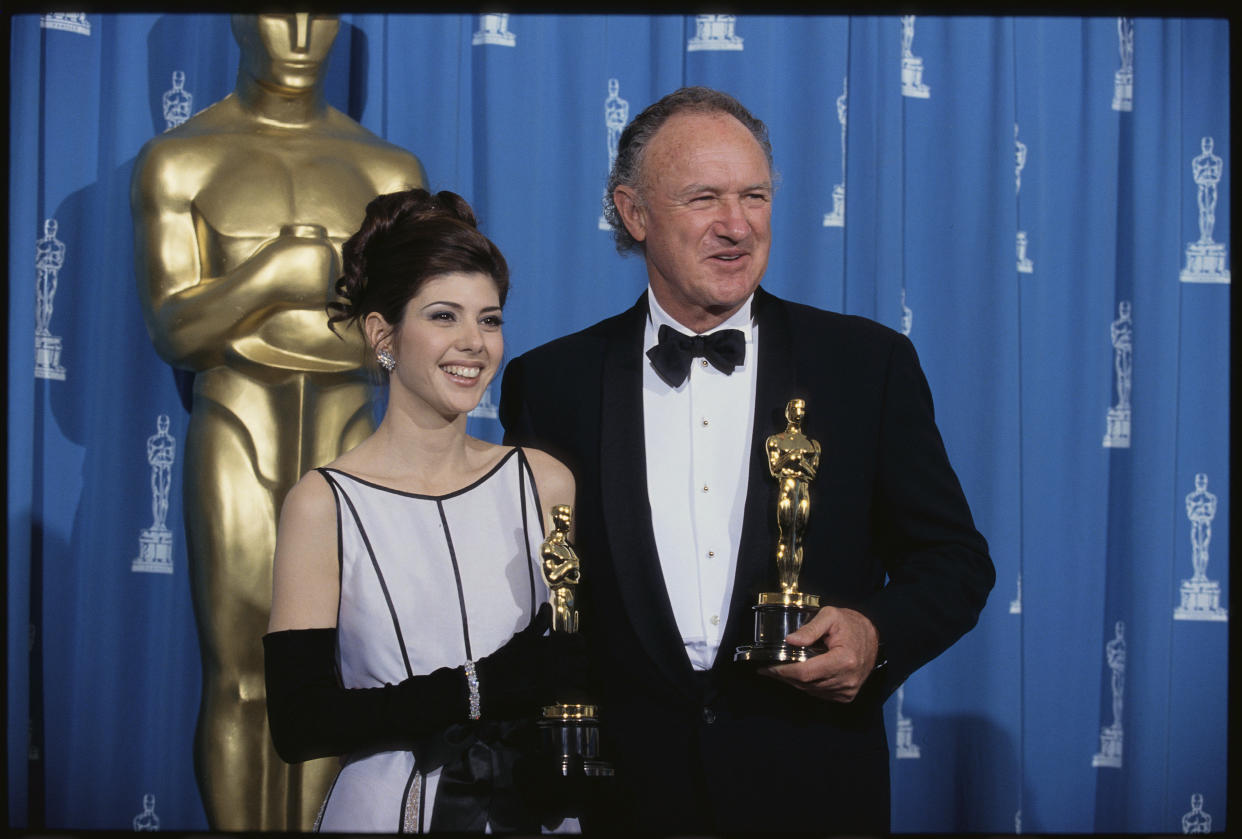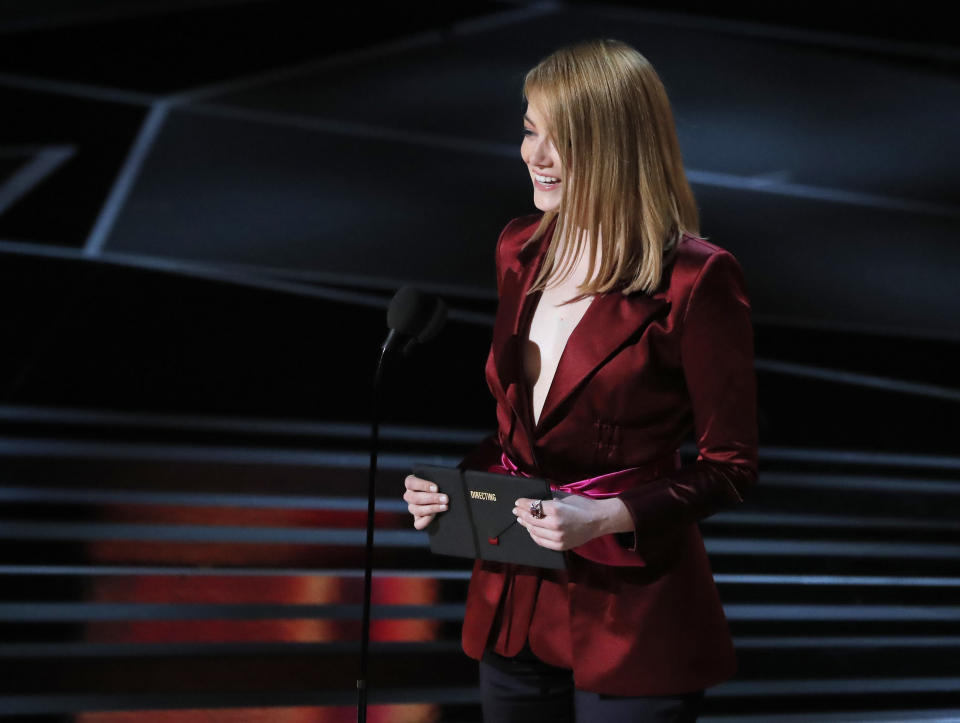Opinion | The 1993 Oscars Were All About Diversity, Too. Then Nothing Changed.

“The industry is an ecosystem that’s sick,” Bette Midler told theNew York Times in 1993, shortly after the broadcast of the 65th annual Oscars. That year, the Academy dubbed its award ceremony “The Year of Woman,” attaching itself to the then-unprecedented rise of women in politics. The 1992 national election ushered a record number of women to national office: A whopping 24 women were elected to the House of Representatives and four women became U.S. senators. It was an electoral wave that sealed Bill Clinton’s presidential victory.
That political sea change was powered in part by women’s outrage at the confirmation of Clarence Thomas to the Supreme Court and growing awareness of sexual harassment in the workplace. In the fall of 1991, Anita Hill had introduced an ignorant nation to the complexities of workplace sexual harassment, testifying before the all-white and all-male Senate Judiciary Committee at Thomas’ confirmation hearings. Sexism was on full display, and what became painfully clear to women at that time was the necessity of women lawmakers on the federal level.
Sexual harassment laws changed, and later as part mea culpa and mostly as the right thing to do, then-Senate Judiciary Committee chairman Joe Biden championed the Violence Against Women Act, landmark legislation designed to protect women from stalking, domestic violence and sexual assault.
There’s a strange symmetry to our current social, cultural and political moment. In 1993, we witnessed appalling sexism soon followed by activism, challenge, protest and policy transformation. The nation minted a new president in 2016, one who had bragged on video about harassing and assaulting women. Weeks later, four million women took to city streets nationwide to protest, inspiring and launching a wave of progressive women candidates for office. By the end of 2017, a cascade of allegations and stories finally came to light against powerful men who exploited, harassed or assaulted women across industries and social class.

At Sunday night’s Oscars, host Jimmy Kimmel immediately addressed the elephants and gorillas in the room, acknowledging the allegations against the industry’s most notorious offender who, as a result of those allegations, is not longer a member of the Academy ― Harvey Weinstein.
But amid the glamour, elegance and cheeky humor, the overall tone of the ceremony was self-conscious and sedate. Kimmel’s monologue faithfully acknowledged it’s hard to find humor in a business where actresses areroutinely underpaidcompared to their male counterparts, especially when that inequity is perpetuated by thevery agentswho represent those actresses.
Presentersstood in solidarity with Dreamers, while others made oblique jabs at the current president. Kristen Anderson Lopez, who won the Oscar for Best Original Song, praised the diversity in her category. The night’ssharpest jabcame from Emma Stone: announcing the nominees for Best Director, she praised “these four men and Greta Gerwig [who] created their own masterpieces this year.”
For the Academy, the 1993 ceremony was an unserious gesture and clumsy attempt to align itself with a political moment it had not yet earned. Women in Hollywood had not yet seen a substantial shift in the roles offered them that recognized the full breadth of their humanity, nor had they seen any inroads in positions of power behind the camera.
Actors of color felt these problems acutely. “I turn down things a lot,” Alfre Woodardtold The New York Times then, “because I get asked to be a moral prop that makes the writers or filmmakers feel better about themselves. They see women and people of color as one-dimensional, which makes for very boring cinema.”
Twenty-five years later, not enough has changed. But some things have. The women of Hollywood are now actual and very real change agents, leaders and organized activists. The founders of Time’s Up ― women like Kathleen Kennedy, Reese Witherspoon and Shonda Rhimes ― have a plan to address discrimination and abuse within their industry and beyond.

It took 25 years, asocial media movementto compel the Academy to make strides to reflect the diversity of American society,admitting younger membersanda record number of African Americans.It took 25 years before we finally saw Best Picture movies for which a woman and person of color were nominated for best director ― Gerwig and Jordan Peele ― and recognized for films that extend beyond trope and stereotype.
In the years in between, we learned the depth of the toxic culture of Hollywood, of rampant sexual assault and misconduct and intimidation perpetuated by a network of enablers from agents to producers.
In 1993, Weinstein was on the rise as the industry’s most powerful broker, and Annabella Sciorra had starred in one the previous year’s highest grossing films, “The Hand That Rocks The Cradle.” We’d later learn that between then and now, Sciorra was allegedly raped by Weinstein, and that he had used his considerable influence to harm her career ― which made Sciorra’s presence at Sunday’s Oscars all the more powerful. In her first public appearance since the Weinstein story broke, Sciorra ― flanked by Salma Hayek and Ashley Judd ― was greeted with warm cheers. “The journey has been long but a new path has emerged,” she said.
The trio’s appearance was a testament to empowerment and unity representing Time’s Up,a legal defense fund that has already raised $21 million dollarsto support those who have suffered sexual harassment and abuse in the workplace.

In her acceptance speech on Sunday, newly crowned Best Actress Frances McDormand said, “I have two words that I want to leave with you tonight:Inclusion Rider.” The formidable McDormandcajoledher fellow female Academy nominees in all categories to stand up during her acceptance speech to give the room (and the audience at home) “perspective” and to amplify the call to action, stressing that women in Hollywood have stories to tell and projects to fund.
Her invocation of inclusion riders was a demand that productions ink their commitment of inclusive and diverse workplaces, that they go beyond the feel-good lip service that peppers these broadcasts. It underscores apointillustrated by Ava DuVernay, whoused Instagramto showcase the diverse and inclusive crew behind her new film “A Wrinkle in Time,” demonstrating that diversity isn’t simply a cosmetic problem solved with casting. It must be holistic, providing opportunities for ethnically and gender diverse film crews.
Hollywood’s diversity problem exists in the liminal space of representation and labor. Who gets the jobs in front of the camera to present plural and inclusive narratives of American life? Who gets the jobs behind the camera to render those narratives visible?
Sunday night’s ceremony included a brief video showcasing the industry’s trailblazing creators, people like Gerwig, Dee Rees, Barry Jenkins, Lee Daniels, DuVernay and Peele.
“Some of my favorite movies are movies by straight dudes, about straight white dudes,” Kumail Nanjiani said in the video. “And now straight white dudes can watch movies starring people like me that you can relate to. I’ve been doing it my whole life. It’s not that hard,” said the writer and star of “The Big Sick.”
The other videos, like the montages of cinema’s greatest moments, were wonderful to behold, and I, too, have a warm place in my heart for those moments. But most of characters and luminaries they featured don’t look like me or share my experiences. Representation continues to matter.
A post shared by Ava DuVernay (@ava)on Jun 14, 2016 at 3:45pm PDT
So does labor ― a fair shot at good work, and safety on the job. “We’re going forward for an equitable and safe world for women,” Mira Sorvino said on ABC’s red carpet. The women of Hollywood mean business. They’re intent on changing the structure and culture of how the industry’s business is done. OnThursday, a consortium of women investors purchased the Weinstein Company for $500 million with a new board and vision, and resources to compensate victims.
Twenty five years after the Academy’s milquetoast salute to women, we’re seeing something new. We’re watching world-weary veteran stars, and a younger generation of women filmmakers, manifest a world where an Academy celebration dedicated to women isn’t just lip service, but a splendid reality in a possible, yet distant future.
Syreeta McFadden is a writer and professor of English at the Borough of Manhattan Community College, City University of New York. Her work has appeared in the New York Times Magazine, The Guardian, Rolling Stone and BuzzFeed News.
ALSO ON HUFFPOST OPINION
Are Black Americans Allowed In Wakanda?
Women Aren't 'Mysteries' -- And They Don't Need To Be Solved
This article originally appeared on HuffPost.

